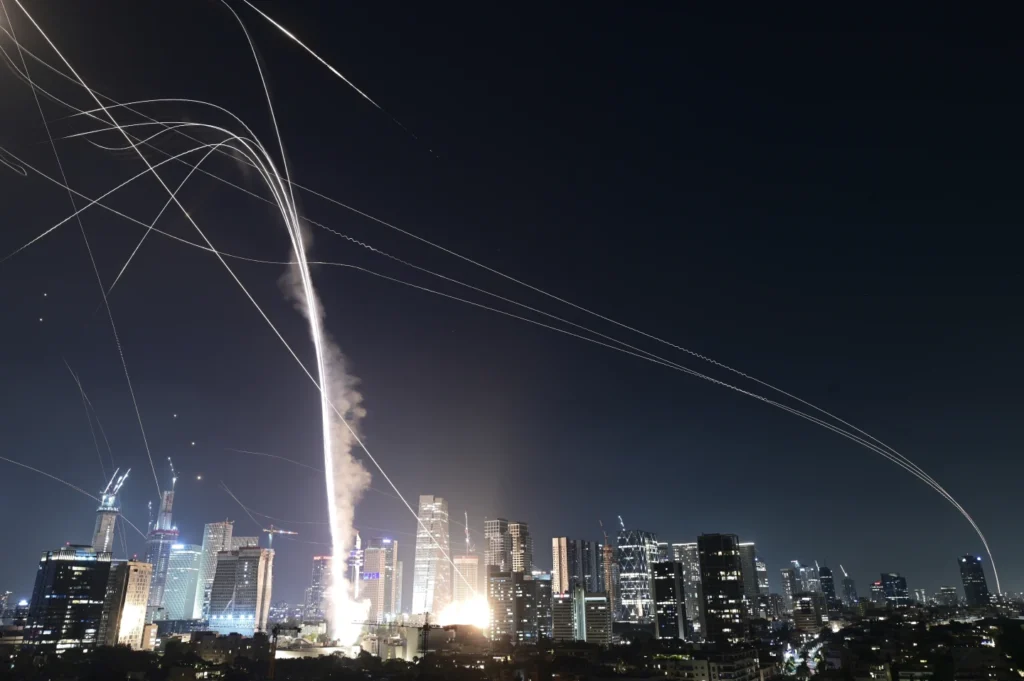JERUSALEM/TEHRAN/WASHINGTON (BN24) — The U.S. military has joined efforts to intercept missiles fired by Iran at Israel in retaliation for a sweeping Israeli air campaign that struck the heart of Iran’s nuclear and military infrastructure, a U.S. official confirmed Friday.

The official, speaking on condition of anonymity due to the sensitivity of ongoing operations, said American military assets had been repositioned closer to Israel in recent days. Though details remain classified, past operations have seen U.S. destroyers and fighter jets play a key role in intercepting inbound threats. The assistance comes amid mounting fears of a broader war in the Middle East following Israel’s largest-ever strike inside Iranian territory.
In a high-risk and long-planned operation, Israel unleashed waves of airstrikes and drone attacks early Friday across Iran, targeting uranium enrichment facilities in Natanz and Fordo, and a nuclear research center in Isfahan. Israeli military sources said the strikes were carried out by nearly 200 aircraft and supported by Mossad-commanded drone units that had pre-positioned explosives near Iranian air defense batteries.
Among the most significant casualties were three of Iran’s highest-ranking military leaders: Armed Forces Chief Gen. Mohammad Bagheri, Revolutionary Guard Commander Gen. Hossein Salami, and Gen. Amir Ali Hajizadeh, head of the elite force’s missile program. Iranian Supreme Leader Ayatollah Ali Khamenei confirmed their deaths, describing them as martyrs and accusing Israel of committing a “great crime.”
“The Zionist enemy has opened its wicked and blood-stained hand to a crime in our beloved country,” Khamenei said in a televised address, vowing revenge and pledging that Israel “will not escape unharmed.”
Late Friday, Iran retaliated with a barrage of more than 100 ballistic missiles and drones launched toward Israel. Loud explosions echoed over Tel Aviv and Jerusalem, where smoke was seen rising and emergency crews responded to reports of injuries. Israeli military officials confirmed that many of the incoming threats were being intercepted outside national airspace with the assistance of allied forces, including the U.S.
Brig. Gen. Effie Defrin, an Israeli military spokesperson, said the strike on Natanz had “significantly degraded” Iran’s nuclear capacity and that the broader operation could continue for up to two weeks. “This mission is not over,” he said. “It is the beginning of a necessary campaign to prevent a nuclear-armed Iran.”
The Biden administration, while publicly distancing itself from Israel’s unilateral action, confirmed that military resources were being shifted across the region to protect American assets and personnel. Two U.S. officials said American warships had been moved closer to the eastern Mediterranean and that embassy personnel in Baghdad had been partially evacuated as a precaution.
U.S. Secretary of State Marco Rubio emphasized that Washington had not participated in the Israeli strikes but reaffirmed support for Israel’s right to self-defense. He also issued a stern warning to Iran: “Let me be clear: the United States will defend its people and interests in the region without hesitation.”
President Donald Trump, reelected in November, broke his silence on the crisis Friday via Truth Social, urging Iran to abandon its nuclear ambitions. “Iran must make a deal before there is nothing left,” he posted, warning that “Israel’s attacks will only get worse” if Tehran continues its current path.
Friday’s events triggered widespread condemnation and alarm. The United Nations Security Council convened an emergency meeting at Iran’s request, while world leaders called for restraint. Iran’s Foreign Minister Abbas Araghchi labeled the Israeli attacks “state terrorism” in a formal letter to the Council and declared that Iran had the right to self-defense under international law.
In Tel Aviv and Jerusalem, residents scrambled for supplies amid reports of further Iranian reprisals. Military reservists were activated, and troops deployed across Israel. Though streets were largely deserted, officials urged calm and insisted defense systems were intercepting the majority of inbound threats.
Hezbollah, Iran’s proxy in Lebanon, offered condolences but stopped short of declaring direct involvement. The group’s last major war with Israel ended with a U.S.-brokered ceasefire in late 2024, after most of its senior leadership was eliminated in Israeli strikes.
Israeli Prime Minister Benjamin Netanyahu said in a recorded statement that the attack had been in preparation since November, shortly after Hezbollah leader Hassan Nasrallah was killed. The final order to launch was given after Iran was censured on Thursday by the International Atomic Energy Agency (IAEA) for failing to comply with nuclear safeguards.
“This was a preemptive strike—one that became necessary to prevent Iran from crossing the nuclear threshold,” Netanyahu said. “The danger to Israel’s survival was real and imminent.”
Israel maintains that its intelligence showed Iran was weeks—possibly days—away from being able to assemble a nuclear weapon, despite international assessments suggesting Tehran had not yet resumed weaponization.
While Israeli officials insisted their strikes were aimed solely at military and nuclear targets, Iran accused Israel of hitting residential neighborhoods. State media shared images of damaged homes and wounded civilians in Tehran and Isfahan. Khamenei vowed the country would pursue justice for “our fallen scientists, our generals, and our civilians.”
Despite high casualties among Iran’s top leadership, the country has not yet signaled whether it will escalate beyond missile retaliation. Analysts warn that the death of senior military figures could limit Iran’s ability to coordinate a longer-term response.
The International Atomic Energy Agency said Friday that it was closely monitoring radiation levels and damage to Iran’s enrichment infrastructure. Meanwhile, U.S. intelligence continues to assess whether Iran intends to rebuild its nuclear program or shift further underground.
Regardless, Israeli leaders have made clear they view this moment as existential. “This is not about politics,” said Defense Minister Israel Katz. “This is about survival.”



